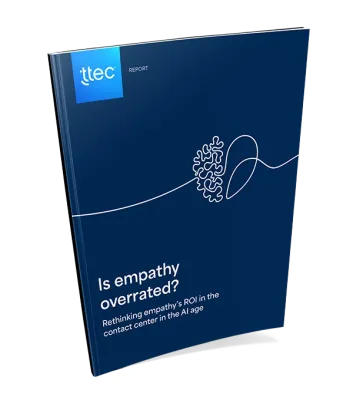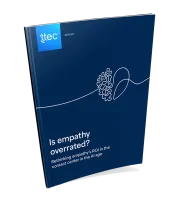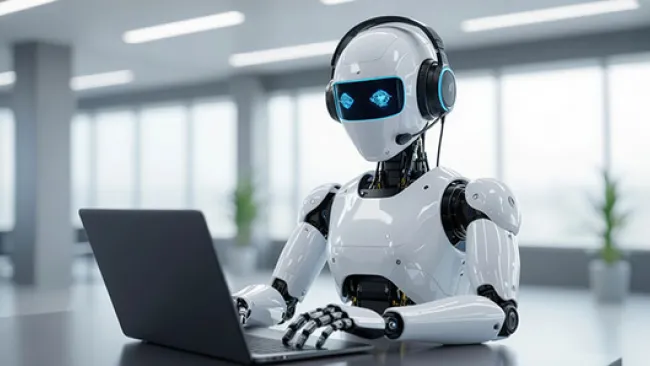Consumers are increasingly interacting with AI when making buying decisions, but many still prefer interacting with brands on a human level when making large purchases, a new report shows.
For its B2C Buyer Experience Report 2025, Invoca surveyed 1,000 U.S. and U.K. consumers who made a “high-stakes” purchase in the last 12 months in the automotive, healthcare, home services, insurance, financial services, telecommunications, and travel industries. A high-stakes purchase was defined as one where consumers take time to weigh their options and conduct research before making a decision.
Customers have mixed feelings about AI
Customers are increasingly interacting with brands’ AI tools (including chatbots) when making buying decisions, Invoca found. Only 16% of respondents said they haven’t interacted with AI.
But just because they’re using AI more often doesn’t mean consumers always like it. While 35% of respondents said AI improved their buying experience, 29% said it worsened their experience, and 35% percent said it made no difference.
For many respondents, AI seems unavoidable in the current customer experience (CX) landscape: 60% said they feel forced to use a brand’s AI when trying to find information or get answers to their questions. And when they are serviced by AI, only 37% of consumers feel positive about those interactions, while 30% feel negatively about AI interactions and another 30% are indifferent.
When customers must interact with brands’ AI:
- 46% of customers feel less valued
- 36% are satisfied with the help they receive most or all of the time
- 27% are rarely or never satisfied
AI + humans remain key to CX success
Despite some misgivings about AI, there are times when customers feel technology can meet their needs better than human associates can – especially when they need quick answers.
The survey found customers prefer AI when it can resolve their issue faster than a human could, the task they need done is simple, it helps them avoid waiting on hold, and they don’t want to talk to a person.
But there are still instances when human interactions are better. Customers don’t think AI is good at solving complex issues, providing empathy, understanding context and nuance, personalizing communication, or following through on requests.
Especially when it comes to high-stakes purchases, humans remain a critical piece of the CX puzzle, with 57% of consumers saying human connection is very important (and another 27% saying it’s important). And most buyers are more willing to use a brand’s AI assistants when they know they can also easily reach a human representative.
To provide the best CX, brands need to embrace a balance of AI-driven tools and human experts that complement each other.
“AI has fundamentally changed how consumers research and arrive at purchase decisions,” Peter Isaacson, Invoca’s chief marketing officer, said in a statement. “But in high-stakes moments like buying a car or choosing insurance, customer experience can still make or break the sale. It's not about AI versus humans. It's about using AI to empower people to connect, convert, and close when it matters most.”
Customers especially want to speak with people when they’re encountering a problem and need help, the survey found. Forty-four percent of customers prefer calling a brand when a problem arises, compared with just 4% who’d rather communicate with a chatbot or AI assistant.
Generative AI factors into buying decisions
Much of Invoca’s survey focused on consumers’ opinions regarding brand-owned AI tools, such as AI agents and chatbots, but it also explored the role generative AI tools like ChatGPT, Claude, and Gemini is playing in high-stakes customer journeys.
More than 40% of customers said they use generative AI tools when researching a big purchase and, unsurprisingly, younger consumers are most likely to use them. Most Gen Zers (61%) have used generative AI for pre-purchase research while only 11% of Baby Boomers have.
Customers who use gen AI in their decision-making process, use it to:
- Get quick summaries on product, service, or pricing options
- Compare different brands
- Generate questions to ask a salesperson
- Get help interpreting customer reviews
- Better understand complex topics
The future of CX is hybrid
Shoppers may not be completely satisfied with AI’s impact on CX but, the survey found, they feel that AI is here to stay – and that the technology will likely keep improving.
Many people still prefer to speak to a person when making high-stake purchases, but respondents were generally optimistic about AI’s potential to improve CX.
More than half of respondents, or 57%, said AI will become more helpful in the next three years and 42% think AI eventually will replace human associates for certain tasks in the contact center.
Consumers are ready to embrace AI but they reject the notion that AI can fully replace human interactions. There are certain tasks automation can handle well and others that will always require a human touch, proving brands must strike a careful balance of technology and people if they’re going to improve satisfaction, foster loyalty, and grow sales.














